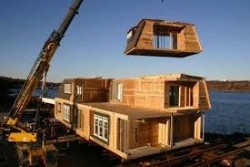Prefabricated housing construction and OSM seen as a potential solution for the UK housing shortage
13th August, 2015

The UK government is looking to other foreign housing construction markets such as Germany to understand the possible solutions to the UK's housing shortage crisis and the need to adopt innovative and new construction practices to accelerate the rate of construction. It is clear that the UK requires a significant increase in the rate of construction of new homes and by using traditional construction methods would impose a considerable strain on the industry which is already finding difficulty in recruiting skilled labour.
One solution to the UK housing shortage crisis combined with a skill shortage is to implement off-site manufacturing construction practices (OSM). This approach adopts a prefabricated housing construction method where the main components are constructed away from the building site and in a factory environment. Japan, northern Europe and North American markets have widely adopted these techniques when building homes. In Germany, prefabricated housing construction has been adopted since the 1920s and currently there are more than 100 OSM producers operating in the construction market. Current estimates place about one third of the total detached and semi-detached housing market is taken up by prefabricated homes in Germany. The remaining two-thirds of German's housing market is being produced by traditional but increasingly standardised and mechanised on-site processes. It is the clear adoption of these new construction techniques in Germany which the UK government is keen to see implemented in the UK.
In Australia, several firms are leading the way in the adoption of prefabricated housing construction technologies. Off-site construction techniques are addressing Australia's skills shortage in the construction industry and the requirement for increased construction rates. The market conditions in Australia are very similar to the ones faced in the UK. One company has highlighted that by adopting precast housing construction techniques they can reduce a two-storey house build, which is currently being undertaken in Melbourne, to only six months. By using traditional construction methods, the same building would take twelve months to complete. MJB Industries are also adopting precast construction methods and the company has manufactured seven precast homes to date. The company has stated that the time taken to construct these homes is dramatically reduced with clients impressed with the lack of rubbish and waste created during the construction process.
The UK construction industry is facing a real problem associated with the lack of a skilled workforce at the current time and this is compounded by the issues faced with the shortages of bricklayers and bricks being manufactured. The recession in 2008 resulted in a significant number of brick plants closing in the UK and the upturn in construction demand has resulted in 20% of all bricks used in the UK being imported and sourced from the Netherlands or Belgium. UK brick output in 2014 topped 2Bn in 2014 which is the first time this level of output has been reached since 2007. The increased adoption of prefabricated housing construction and precast construction techniques will release some of the pressure being placed on the brick industry and UK construction market.
Precast construction methods have been widely adopted in emerging markets to resolve the issues with housing and the need for cheaper housing solutions. Tekla India Pvt Ltd is a leading technology firm providing Building Information Modelling (BIM) software for the Indian construction market. Tekla and PIIPL have recently announced a strategic partnership where PIIPL will use Tekla Structures to create accurate, constructable models to help facilitate efficient manufacturing of the precast elements off-site. Precast construction methods are estimated to save developers 60% of their time compared to in situ construction methods and these techniques have become important to help drive investment in the India housing construction industry and supply homes in an efficient way.
The global precast and prefabricated construction market is forecast to be worth US$208.79Bn by 2020 as the industry forecasts revenues to increase by 6.5% CAGR during 2015 to 2020. Strong demand for prefabricated housing is expected to be sourced from both the developed and developing markets.
For more information on the subject of prefabricated construction, see the latest reports: Prefabricated Construction Market
Source: Companies and Markets








